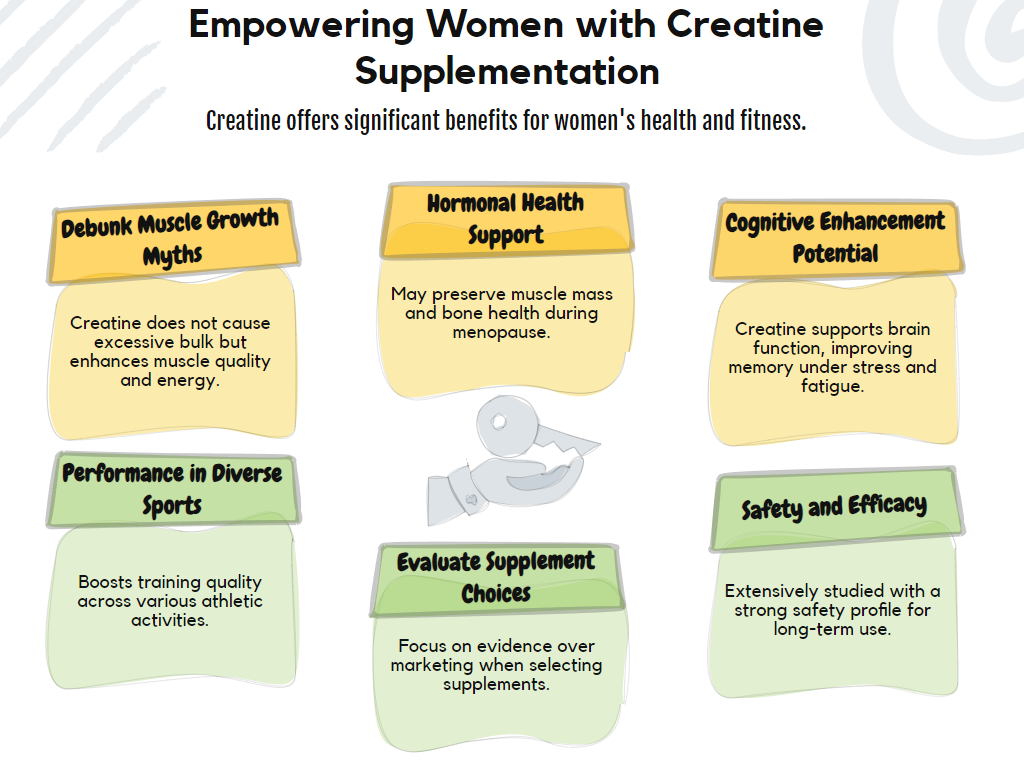
Why Women Should Reconsider Creatine Supplementation
Why Women Should Reconsider Creatine Supplementation
Creatine sits in a peculiar spot in the supplement world. Men embrace it. Women avoid it. Science supports it. Myths surround it.
This disconnect between perception and reality has created one of the most significant missed opportunities in women's health and fitness. While men have benefited from decades of creatine research and application, women have largely remained on the sidelines, often due to misconceptions that have little basis in scientific reality.
The truth about creatine deserves a fresh examination, particularly through the lens of women's health, where its benefits may be even more profound than commonly recognized.
Beyond Bulky Muscles
The first hurdle to clear is the persistent myth that creatine automatically leads to bulky muscles. This misconception has kept countless women from exploring a supplement that offers benefits far beyond the weight room.
Creatine works by increasing phosphocreatine stores in your muscles, which helps your body produce more adenosine triphosphate (ATP), the primary energy currency of cells. This process supports high-intensity, short-duration activities like sprinting or lifting weights. While this can indeed support muscle development when combined with resistance training, it does not cause excessive muscle growth without that stimulus.
For women concerned about body composition, research consistently shows that female creatine users experience improvements in strength without significant changes in body mass that would create a "bulky" appearance. The changes typically manifest as increased muscle quality rather than quantity.
Cognitive Benefits Few Discuss
Perhaps the most overlooked aspect of creatine supplementation is its impact on brain function. Your brain, like your muscles, uses ATP for energy, and creatine helps maintain those energy levels.
Research suggests that creatine supplementation may improve memory and intelligence tasks, particularly under stressful conditions or sleep deprivation. For women juggling careers, family responsibilities, and personal wellness, these cognitive benefits could prove invaluable.
Studies have shown particular promise for vegetarians and vegans, who typically have lower baseline creatine levels since the compound is primarily found in animal products. Women are more likely than men to follow plant-based diets, potentially making this benefit especially relevant.
Hormonal Health Considerations
Women experience unique hormonal fluctuations throughout their lives that can impact everything from energy levels to bone density. Emerging research suggests creatine may offer supportive benefits during these transitions.
During menopause, when estrogen levels decline, women face increased risk of muscle loss and bone density reduction. Creatine supplementation, particularly when combined with resistance training, may help preserve lean muscle mass and support bone health during this critical period.
Additionally, some preliminary research indicates that creatine might help mitigate the energy fluctuations some women experience during their menstrual cycles, though more studies are needed in this area.
Athletic Performance Beyond Stereotypes
The athletic benefits of creatine extend far beyond traditional weightlifting. Women participating in high-intensity interval training, CrossFit, sprint sports, tennis, and even endurance activities that include high-intensity components can benefit from improved phosphocreatine recovery between efforts.
This translates to better training quality, which drives better results regardless of your fitness goals. Whether you're training for performance, health, or aesthetics, the ability to maintain higher quality work throughout your session creates compounding benefits over time.
Female athletes in particular may see proportionally greater benefits than their male counterparts. Some research suggests that women, who typically start with lower baseline creatine stores, might experience more noticeable improvements when supplementing.
Safety Profile and Practical Considerations
Creatine monohydrate stands as one of the most extensively studied supplements available, with a safety profile that has withstood decades of scientific scrutiny. The International Society of Sports Nutrition has consistently affirmed its safety for both short and long-term use.
Common concerns about kidney damage have been repeatedly debunked in healthy individuals. The temporary water retention some users experience typically resolves within weeks and primarily affects intracellular water, not causing the puffy appearance some women fear.
The standard recommendation of 3-5 grams daily proves effective for most women, without requiring the loading phase often discussed in bodybuilding circles. This approach minimizes any initial water retention while still providing the full spectrum of benefits.
Rethinking Supplement Priorities
When considering supplement strategies, women often gravitate toward products marketed specifically to them, many of which lack substantial scientific backing. Meanwhile, creatine, with its robust research support, gets overlooked due to gendered marketing and misconceptions.
This represents a fundamental misalignment between evidence and practice. The supplement with perhaps the strongest scientific support for women receives the least attention in women's health and fitness conversations.
Smart supplementation starts with evaluating evidence rather than marketing. By this standard, creatine deserves a prominent place in the conversation about women's health optimization.
The Broader Perspective
The creatine conversation reflects a larger issue in health and fitness: the tendency to gender nutritional strategies despite limited physiological justification. While hormonal differences between men and women certainly impact some aspects of metabolism and training response, the fundamental cellular mechanisms that creatine affects remain consistent across genders.
Forward-thinking health approaches recognize that evidence should lead recommendations, not traditional gender associations. The benefits of creatine for cognitive function, muscle preservation, bone health, and performance apply to humans, not just men.
The question women should consider isn't whether creatine belongs in a "female supplement regimen," but rather whether its well-documented benefits align with their personal health and performance goals.
For most active women seeking cognitive support, improved training capacity, and long-term health benefits, the evidence suggests the answer is increasingly clear. Creatine deserves reconsideration, free from outdated myths and gender-based marketing limitations that have kept its benefits disproportionately in the male domain.
The science speaks clearly. The decision to listen belongs to each individual woman evaluating her health optimization strategy based on evidence rather than convention.
